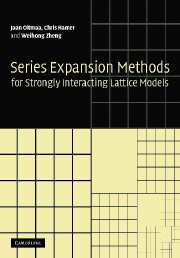Book contents
- Frontmatter
- Contents
- Preface
- 1 Introduction
- 2 High- and low-temperature expansions for the Ising model
- 3 Models with continuous symmetry and the free graph expansion
- 4 Quantum spin models at T = 0
- 5 Quantum antiferromagnets at T = 0
- 6 Correlators, dynamical structure factors and multi-particle excitations
- 7 Quantum spin models at finite temperature
- 8 Electronic models
- 9 Review of lattice gauge theory
- 10 Series expansions for lattice gauge models
- 11 Additional topics
- Appendix 1 Some graph theory ideas
- Appendix 2 The ‘pegs in holes’ algorithm
- Appendix 3 Free graph expansion technicalities
- Appendix 4 Matrix perturbation theory
- Appendix 5 Matrix block diagonalization
- Appendix 6 The moment–cumulant expansion
- Appendix 7 Integral equation approach to the two-particle Schrödinger equation
- Appendix 8 Correspondences between field theory and statistical mechanics
- Appendix 9 Computer programs
- Bibliography
- Index
Preface
Published online by Cambridge University Press: 06 January 2010
- Frontmatter
- Contents
- Preface
- 1 Introduction
- 2 High- and low-temperature expansions for the Ising model
- 3 Models with continuous symmetry and the free graph expansion
- 4 Quantum spin models at T = 0
- 5 Quantum antiferromagnets at T = 0
- 6 Correlators, dynamical structure factors and multi-particle excitations
- 7 Quantum spin models at finite temperature
- 8 Electronic models
- 9 Review of lattice gauge theory
- 10 Series expansions for lattice gauge models
- 11 Additional topics
- Appendix 1 Some graph theory ideas
- Appendix 2 The ‘pegs in holes’ algorithm
- Appendix 3 Free graph expansion technicalities
- Appendix 4 Matrix perturbation theory
- Appendix 5 Matrix block diagonalization
- Appendix 6 The moment–cumulant expansion
- Appendix 7 Integral equation approach to the two-particle Schrödinger equation
- Appendix 8 Correspondences between field theory and statistical mechanics
- Appendix 9 Computer programs
- Bibliography
- Index
Summary
The past 50 years have seen much progress in our understanding of the behaviour of complex physical systems, made up of large numbers of strongly interacting particles. This includes a rather detailed, if not complete, understanding of such phenomena as phase transitions of various kinds, macroscopic quantum phenomena such as magnetic order and superconductivity, and the response of such systems to external probes, vital for the interpretation of experimental results. Such unifying concepts as scaling and universality, long-range order (including off-diagonal, long-range order), and spontaneous symmetry breaking have led to a unified understanding of diverse and complex phenomena.
Central to this endeavour has been the detailed and systematic study of lattice models of various genera models which are precisely defined mathematically, which are believed to embody the essential physics of interest, and which are, to a greater or lesser extent, mathematically tractable. Exact analytic treatment of these models is rarely possible. Series expansion techniques, the subject of this book, provide one of the main systematic and powerful approximate methods to treat such lattice models. Our decision to write this book arose from a request from a journal editor to write a review of our group's work over the last decade on series studies of quantum lattice models. On reflection, we came to the view that it would be more useful to write a book covering the entire field, at a level which would be accessible to graduate students and other researchers wishing to learn about these methods.
Information
- Type
- Chapter
- Information
- Publisher: Cambridge University PressPrint publication year: 2006
